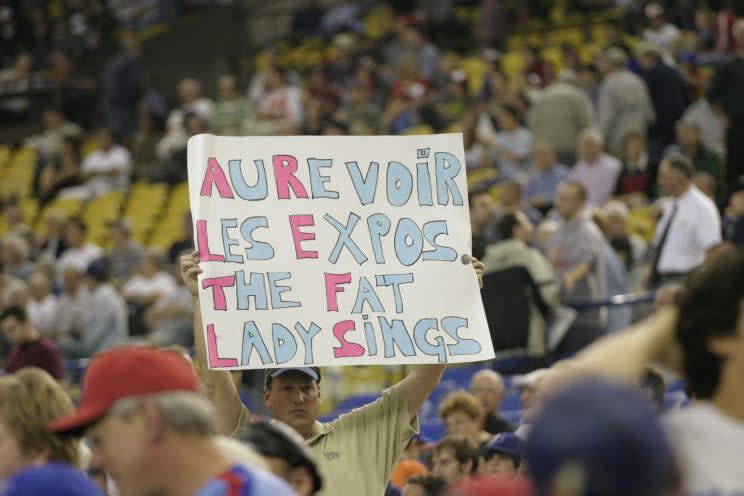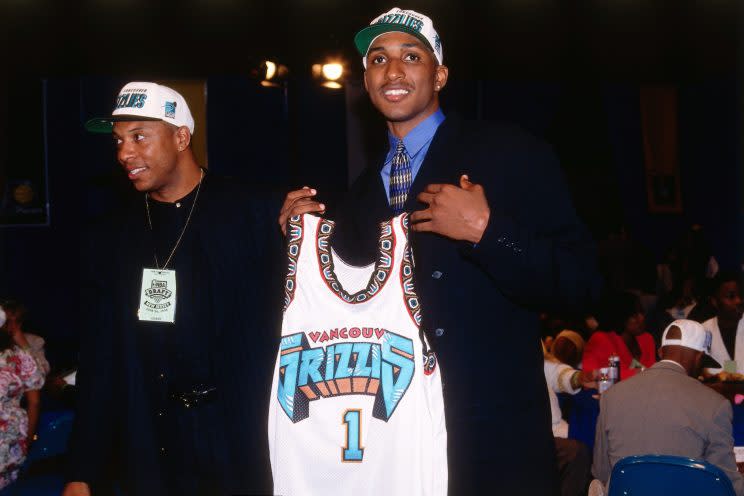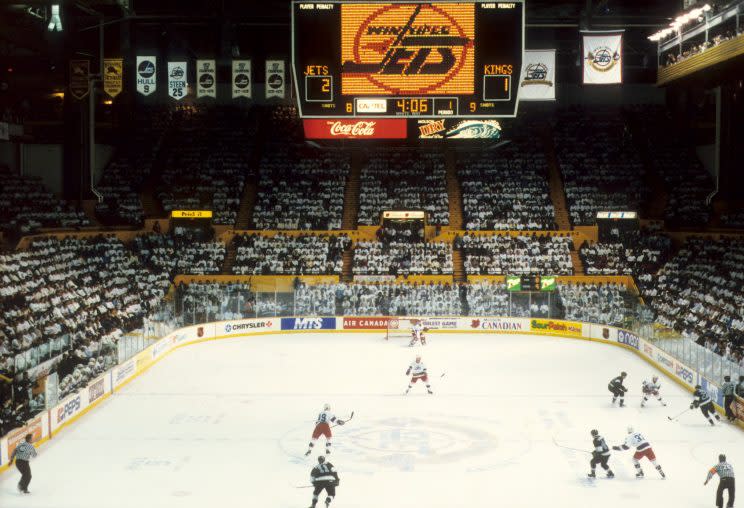Roundtable: What's the worst relocation story for each league?
The San Diego Chargers’ decision to move to Los Angeles last week sparked a lot of questions about the wisdom of the relocation. Our own Dan Wetzel had an opinion. So did Frank Schwab. They were not alone in thinking it was one of the worst moves in sports history.
That begged a question around the Yahoo Sports blog offices: What is the worst franchise move in the history of each sports league? There’s certainly no shortage of options (full list here), so we had one blogger for each sport offer his opinion for this meeting-of-the-minds roundtable.
(And before you ask the question: No, none of us hail from north of the border. Though we do love an occasional poutine.)
NFL: San Diego Chargers to Los Angeles, 2017
Pretty much every team that has relocated through sports history has been welcomed by its new city.
That’s a basic expectation. Maybe some of the moves were done for the wrong reasons or turned out to be a mistake, but at very least teams could count on their new cities embracing them as they moved in.
The Los Angeles Chargers’ move seems to be misguided in many ways, and they also face the almost unprecedented issue that their new city does not seem to want them.
Los Angeles Times columnist Bill Plaschke wrote the day the Chargers announced their move from San Diego that L.A.’s attitude was: “We. Don’t. Want. You.” If you thought that was off base, Los Angeles fans made their feelings clear at last Saturday’s Lakers-Clippers game at Staples Center.
The Chargers’ logo was shown on the video board, and fans from both teams booed. Loudly.
Clippers and Lakers fans just united to boo the hell out of the Chargers when the logo was shown on the big screens at Staples.
— Dave Doyle (@davedoylemma) January 14, 2017
That has to make the Chargers’ brass feel great. Less than a week after Los Angeles got a new NFL team, the fans seem to be rejecting it en masse.
It didn’t make sense that the Chargers would leave San Diego after more than 50 years to be the Rams’ tenants in their upcoming new stadium in Inglewood. It was odd that they didn’t put the $650 million relocation fee toward a new stadium in San Diego. It’s comical that their plan included playing two seasons in a 27,000-seat soccer stadium in Carson. They start their fight for acceptance in a new market trailing the Rams, who moved in last year and had a few decades of previous history in L.A. And now the Chargers have to come to the realization that they’re going to a city that doesn’t seem to want them there.
It’s too early to judge the Chargers’ move. Perhaps they win big, hook a young generation of NFL fans and become a staple on the Los Angeles sports scene. But they’re fighting a battle that might be unique among all relocated teams throughout sports history: They’re going to a new city, and that new city seems to wish they weren’t moving in.
— Frank Schwab (@YahooSchwab), Shutdown Corner
* * *
MLB: Montreal Expos to Washington, 2005

Of all the relocations that have happened in baseball, the Montreal Expos packing up, crossing the border and becoming the Washington Nationals still hurts the most for one sector of fans.
The Expos, who played in the NL East from 1969 to 2004, had a complicated ending, one that is similar to the Chargers in a few ways. They hung in limbo for a few seasons, trying to compete on the field while fans hoped the behind-the-scenes drama would work itself out favorably, thought it wouldn’t.
First, MLB wanted to contract the Expos after attendance dropped severely under then-owner Jeffrey Loria. When that didn’t work — the Twins were also in the contraction plan and they successfully fought it in court — the Expos ended up splitting their final two seasons between Montreal and Puerto Rico. The whole ordeal was strange to baseball fans as a whole and disheartening to the loyalists in Montreal.
What made it worse was the controversy around Loria, now the Miami Marlins owner. When it looked like the Expos would be contracted, he sold his share of the team at a big profit and worked a deal through MLB’s ownership channels to buy the Marlins. He uprooted much of the Expos front office and operations and took it to Miami, leaving Montreal a mess for its final seasons, after MLB’s attempt at contraction failed.
Since becoming the Nats, the organization has enjoyed some success and established a good fanbase over a few playoff runs with former No. 1 overall picks Bryce Harper and Stephen Strasburg. They’ve also had rough postseason exits and are still chasing a World Series.
But in the first 12 seasons, things haven’t been horrible.
They’re not the Expos, though. The connections to that franchise are all but gone, save for fond memories of Vladimir Guerrero’s arm and Pedro Martinez’s fastball. Baseball lovers in Montreal still turn out in mass for exhibition games. Many hope that Montreal will get a new franchise some day and it will get treated better than the Expos were in their final days.
— Mike Oz (@mikeoz), Big League Stew
* * *
NBA: Vancouver Grizzlies to Memphis, 2001

The recent history of NBA relocation understandably focuses on the Seattle SuperSonics, a widely beloved franchise that was moved to Oklahoma City under questionable circumstances. Yet the league has seen many other terrible moves in the past few decades, some of which never gave fans a chance to form anything close to a Sonics-like bond.
One of them involved the Vancouver Grizzlies, one of two Canadian expansion teams to play their first season in 1995-96. The rules at the time prohibited the Grizzlies and Toronto Raptors from holding a top-five pick in their expansion season and the top pick for the next three years, which put them at an unnecessary disadvantage before they played their first game. Vancouver was not surprisingly terrible — it didn’t win a quarter of its games until its fifth year in existence and only really hit on one of its lottery picks (No. 3 pick Shareef Abdur-Rahim in 1996). Otherwise, it was best known for teal uniforms and picking Steve Francis when he had made it abundantly clear he had no interest in moving to British Columbia.
The ownership situation was even worse. In 1996, owner Arthur Griffiths sold both the Grizzlies and Vancouver Canucks to Seattle-based businessman John McCaw, Jr. after experiencing cost overruns on the franchises’ shared arena. McCaw intended to keep the team in Canada but found that a poor exchange rate forced him to carry a very high payroll, his biggest expense. He sold the team to the Chicago-based Michael Heisley in January 2001, and the team moved to Memphis after that same season.
Simply put, the Vancouver Grizzlies were never given an honest chance to succeed. Then-commissioner David Stern said in 2008 that he considers the Vancouver debacle to be one of his biggest regrets, and it’s hard to disagree. The city may still get an NBA team some day, but that past will not be forgotten any time soon.
— Eric Freeman (@freemaneric), Ball Don’t Lie
* * *
NHL: Winnipeg Jets move to Phoenix, 1996

In 1996, the Jets left one of the most preposterously passionate Canadian fan bases in professional hockey for … an American desert.
The catalyst for the move? Economics, as the small-market Winnipeg Jets couldn’t find a new owner to pay the escalating salaries in the NHL, 10 years before implementation of the salary cap would give teams like the Jets “cost certainty.” Nor could they find anyone that would guarantee the team would remain in Winnipeg, which was essential for securing funding for a new arena.
That was one level of bummer. The next was that instead of Phoenix, the Jets nearly relocated to Minnesota, two years after it lost the North Stars to Dallas. But the NHL set a deadline that St. Paul couldn’t meet to work out a deal for the Jets.
So it was off to Phoenix to play in the America West Arena, which wasn’t built for hockey, until 2003 when the team moved to Glendale, which wasn’t convenient to the franchise’s fan base.
The ensuing 20 years included Wayne Gretzky’s run as head coach, in which we learned God was fallible; several different owners; paltry attendance; and a bankruptcy saga beginning in 2009 in which the team nearly relocated to Hamilton, Ont., by a rogue billionaire and then was eventually owned by the NHL itself.
Oh, and missing the playoffs in 11 out of 19 seasons.
In the end, the Jets got another team when the Thrashers relocated; Minnesota got another team when the expansion Wild arrived; and things are looking strong in Arizona, provided we’re talking about its draft lottery odds.
(Please keep in mind that there are very dedicated Coyotes fans who deserve better than what this franchise has given them.)
— Greg Wyshynski (@wyshynski), Puck Daddy
What do you think the worst relocation was? Let us know in the comments below.

